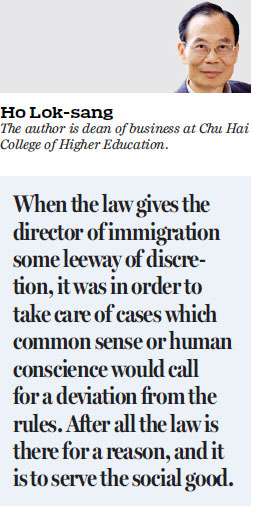Officials' discretionary powers have been there for a purpose

It is unfortunate that many bureaucrats still prefer to stick to rules rather than using the discretionary powers vested in them to cater to special circumstances. Understandably, following long-established rules is always the easier way, since deviating from rules requires explanation and discretion, while following the rules does not. There was a case of a girl, called Ya-er, born in Hong Kong of a Hong Kong father and a mainland mother. The girl's parents divorced unfortunately, after the father got into extra-marital affairs, family violence, and pathetic gambling which plunged the family into one crisis after another. After the divorce, the mainland authorities terminated the mom's application to immigrate to Hong Kong on the ground of joining her husband. The single mother suddenly faced a dilemma: Taking Ya-er to the mainland to live with her is financially not viable, since the girl does not have the household registration, and for such children school fees will be prohibitively expensive for the single mother to bear, and they are also not entitled to other benefits like medical care plans. If Ya-er's mother stays in Hong Kong, however, she would have to return to her home on the mainland every three months to get her visiting visa renewed, and that normally takes about 10 days each time.

The above is a real story reported by the Society for Community Organization. It captured my attention because of the obvious difficulties confronting the child and the mother are totally unnecessary, and because we are supposed to care for the welfare of our children. A Children's Commission is about to be set up next year, according to the government. The Boys and Girls Clubs Association of Hong Kong even started a biennial "Junior Chief Executive" election in 2001. Our children are our future. Yet they are often at the mercy of us the adults. Those of us who are in the position to help should put themselves in their shoes, consider their predicaments, and work out solutions on their behalf.
The story of Ya-er brings to mind the Director of Immigration v Chong Fung-yuen case back in 2001. Chong Fung-yuen was born in Hong Kong while his parents were in Hong Kong visiting Fung-yuen's grandfather Chong Yiu-shing. Chong Yiu-shing was emotionally attached to the grandson and applied for permanent residency on behalf of his grandchild. At the time under the Immigration Ordinance only parents who had the right of abode could apply for the right of abode for their child. The director of immigration did not consider the fact that Fung-yuen's grandfather was a Hong Kong resident, and that it was natural for a grandfather to wish to see his grandchild grow up in Hong Kong. If he had used discretion and had allowed Fung-yuen to be admitted as permanent resident, the case would not have gone to court, and the courts, including the Court of Final Appeal, might not have the occasion to overturn the Immigration Ordinance and open a floodgate for expecting mothers to come to Hong Kong in order to get the right of abode for their newborns.
Of course, Hong Kong is under the common-law system, and it is still possible that someone might challenge the Immigration Ordinance, and the courts might have ruled exactly in the same way. But the point remains that when the law gives the director of immigration some leeway of discretion, it was in order to take care of cases which common sense or human conscience would call for a deviation from the rules. After all the law is there for a reason, and it is to serve the social good. In Ya-er's case, admitting her mother seems to have even stronger grounds, since family reunion is valued universally, and is especially important for children who depend on adults to take care of them and to offer guidance and support. What is the point of a Children's Commission, if the law separates children from their parents or their closest guardians?
Another case that has nothing to do with the right of abode, but that also demonstrates human proneness to follow rules rather than discretion, is the refusal to consider the donation of part of the liver by the daughter of a patient named Tang Kwai-sze, just because her age was short of 18 by a few months. That case was particularly sad, in part because the patient died anyway notwithstanding the availability of a liver by another donor, and in part because the liver failure itself was a result of a medical blunder - namely the failure to administer antiviral medicine as a preventive measure while administering large doses of steroid to tackle a kidney problem, even though the patient was known to carry the hepatitis B virus. Although an age limit for live liver donors should normally be applicable, the mental maturity of a person may not be in line with age. Isn't it better if an expert committee were allowed to assess possible compelling reasons that might justify deviation from the rules?
I would prefer to see a Hong Kong where the human touch reigns supreme, rather than cold, mechanical rules.
(HK Edition 11/28/2017 page8)
Today's Top News
- China expresses condolences over death of Pope
- Vocational education needs revamp to make it fit for modernization
- China's diversified trade injects stability in global economy
- China, Indonesia hold ministerial talks
- External shocks pushing shift of growth model
- Xi congratulates newly elected leaders of Gabon, Ecuador






























